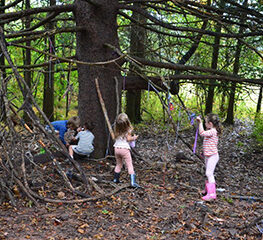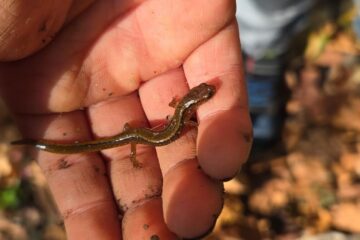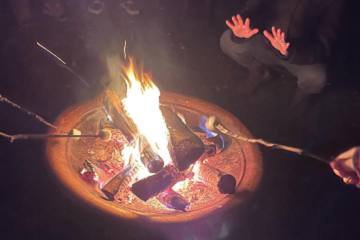 Where does creativity come from in children? And how can parents nurture it?
Where does creativity come from in children? And how can parents nurture it?
As education director at Raritan Headwaters, I’ve had a lot of opportunity to ponder these questions while watching young minds at work. One thing I’ve learned is that unstructured play outdoors unlocks imaginations!
Picture this: A small group of children is playing in a clearing in the forest. Picking up a large stick, one child decides to build a fort. As construction gets underway, it attracts the attention of the other children.
Soon, they are all working together, building walls of larger sticks and a roof of twigs and moss. They decorate the doorway with pine needles, and use stones for a pathway around the structure. As a finishing touch, they build a small “swing” for woodland fairies, using vines and leaves.
This is what a typical day at our “Nature Days” programs looks like, with children leading the way – using nature as a muse, and their own creativity as a guide.
Independent outdoor play like this engages a child’s brain in a multitude of ways: Deciding what size stick will be used for a supporting beam; observing the effects of weight, angle, shape; learning to work together, to voice their own ideas, and weigh the thoughts of other children in the group. As time goes on, each child’s unique skills and strengths come to the top. The future engineers, artists, mathematicians and problem-solvers all cooperate to create something amazing that wasn’t there before.
In addition to the skills that are honed during independent play, there are physical factors at work. Bones and muscles are strengthened through active play, and even the senses are given a workout. Studies have shown that children who play outdoors develop better eyesight and stronger senses of smell, hearing and touch. Children who breathe fresh air and come in contact with healthy, organic soil develop stronger immune systems.
These factors have long-term effects from childhood on through adolescence and adulthood, including:
- Stimulated learning, increased concentration;
- Decreased anxiety, depression, anger and stress;
- Reduced production of cortisol and adrenaline (stress hormones), and an increase in the parasympathetic system (rest and recovery);
- Better sleep;
- Lower blood pressure;
- Reduced allergies and asthma.
Overall, children who spend more time in nature go on to become happier, healthier adults!
It’s Raritan Headwaters’ goal to create programs that let children be children. We provide safe outdoor spaces for independent play and guided learning. Our programs encourage creativity and curiosity, and help children develop a healthy connection with nature, with themselves, and with each other.
In 2021, we have Nature Days programs in Bedminster and Flemington, starting in March and running through August.
To find out more about Raritan Headwaters’ educational programming for children, visit www.raritanheadwaters.org/naturedays.
We also encourage you to visit our Fairview Farm Wildlife Preserve, where you can see some of the structures built by the children that attend our programs in our very own “Fairy Wood!”



